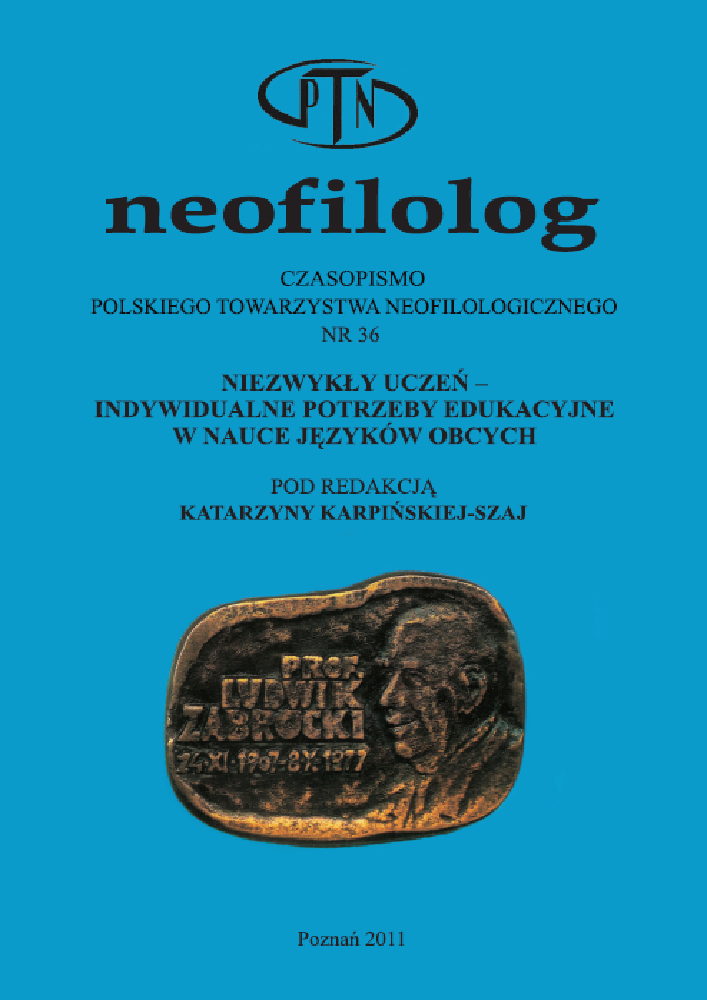Abstrakt
The paper reports the findings of a study that the author conducted in order to investigate the possibility of developing communicative compe-tence in a learner with Asperger‟s Syndrome. Information about the dis-order is followed by enquiry into the notion of the theory of mind which is said to determine the ability to communicate effectively. Since patients with Asperger‟s Syndrome do not demonstrate theory of mind, it is be-lieved they are unable to develop communicative competence. However, the literature in the field points to the therapeutic aspects of foreign lan-guage teaching and therefore the author explored the possibility of im-proving communicative skills in the case of a 13-year-old boy diagnosed with Asperger‟s Syndrome.
Bibliografia
Allman, T. 2009. Asperger’s Syndrome. Farmington Hills, MI: Lucent Books.
Atwood, T. 2007. The complete guide to Asperger’s Syndrome. London: Jessica Kingsley Publishers.
Baron-Cohen, S. 1995. Mindblindness: an essay on autism and theory of mind. MIT Press/Bradford Books.
Baron-Cohen, S., Leslie, A. M. i Firth, U. 1985. „Does the autistic child have a theory of mind?” Cognition, 21 (1985) 37-46.
Canale, M. i Swain, M. 1980. „Theoretical bases of communicative approaches to second language teaching and testing”, Applied Linguistics 1: 1-47.
Celce-Murcia, M. 2007. „Rethinking the role of communicative competence in language teaching”, w: Soler, E. A. i Jorda, M. P. S. (red.) Intercultural lan-guage use and language learning. Dordrecht: Springer, 41-59.
Emmons, P. G. i Anderson, L. M. 2007. Dzieci z zaburzeniami integracji sensorycznej. Warszawa: K. E. Liber.
Hymes, D. 1972. „On communicative competence”, w: Pride, J. B. i Holmes, J. (red.) Sociolinguistics. Harmondsworth: Penguin, 269-293.
Karpińska-Szaj, K. 2006. „Integracyjna koncepcja nauki języka obcego na potrzeby uczniów z niedoborami języka pierwszego”, w: Krieger-Knieja, J. i Paprocka-Piotrowska, U. (red.). Komunikacja językowa w społeczeństwie informacyjnym. Nowe wyzwania dla dydaktyki języków obcych. Lublin: Towarzystwo Naukowe KUL, 56-63.
Kurcz, I. 2005. Psychologia języka i komunikacji. Warszawa: Wydawnictwa Naukowe Scholar.
Nattinger, J. R. i DeCarrico, J. S. 1992. Lexical phrases and language teaching. Ox-ford: Oxford University Press.
Oxford, R. 1990. Language learning strategies: what every teacher should know. Boston, MA: Heinle & Heinle.
Pawley, A. i Frances S. 1983. „Two puzzles for linguistic theory: nativelike selec-tion and nativelike fluency”, w: Richards, J. C. i Schmidt, R. W. (red.) Language and communication. London: Longman, 197-227.
Premack, D. i Woodruff, G. 1978. „Does the chimpanzee have a theory of mind?” Behavioral and Brain Sciences, vol 1. 515-526.
Rausch, J. L., Johnson, M. E. i Casanova, M. F. 2008. Asperger’s Disorder. New York: Informa Healthcare Ltd.
Siek, Piskozub, T. i Wach, A. 2006. Muzyka i słowa. Rola piosenki w procesie przyswajania języka obcego. Poznań: Wydawnictwo Naukowe UAM.
Licencja
Prawa autorskie (c) 2011 Tomasz Róg

Utwór dostępny jest na licencji Creative Commons Uznanie autorstwa – Bez utworów zależnych 4.0 Międzynarodowe.
Przedstawiany utwór (artykuł) upubliczniany jest na podstawie umowy z autorem i na licencji Creative Commons Attribution-NoDerivatives 4.0 International (CC BY-ND 4.0).
Użytkownicy mają obowiązek podania wraz z rozpowszechnionym utworem, informacji o autorstwie, tytule, źródle (odnośniki do oryginalnego utworu, DOI) oraz samej licencji;
- bez tworzenia utworów zależnych,
- utwór musi być zachowany w oryginalnej postaci.
Uniwersytet im. Adama Mickiewicza w Poznaniu zachowuje prawo do czasopisma jako całości (układ, forma graficzna, tytuł, projekt okładki, logo itp.).
